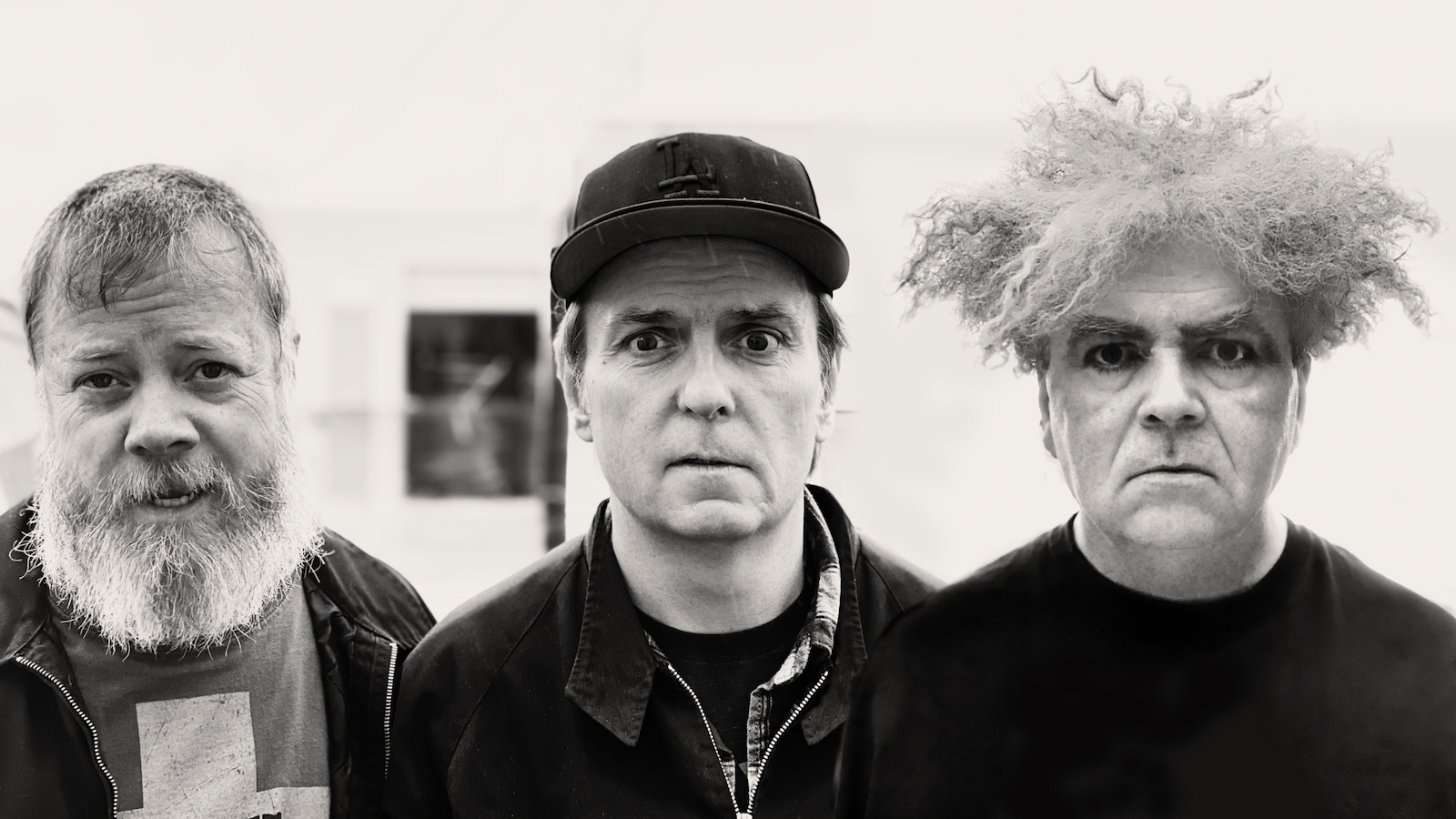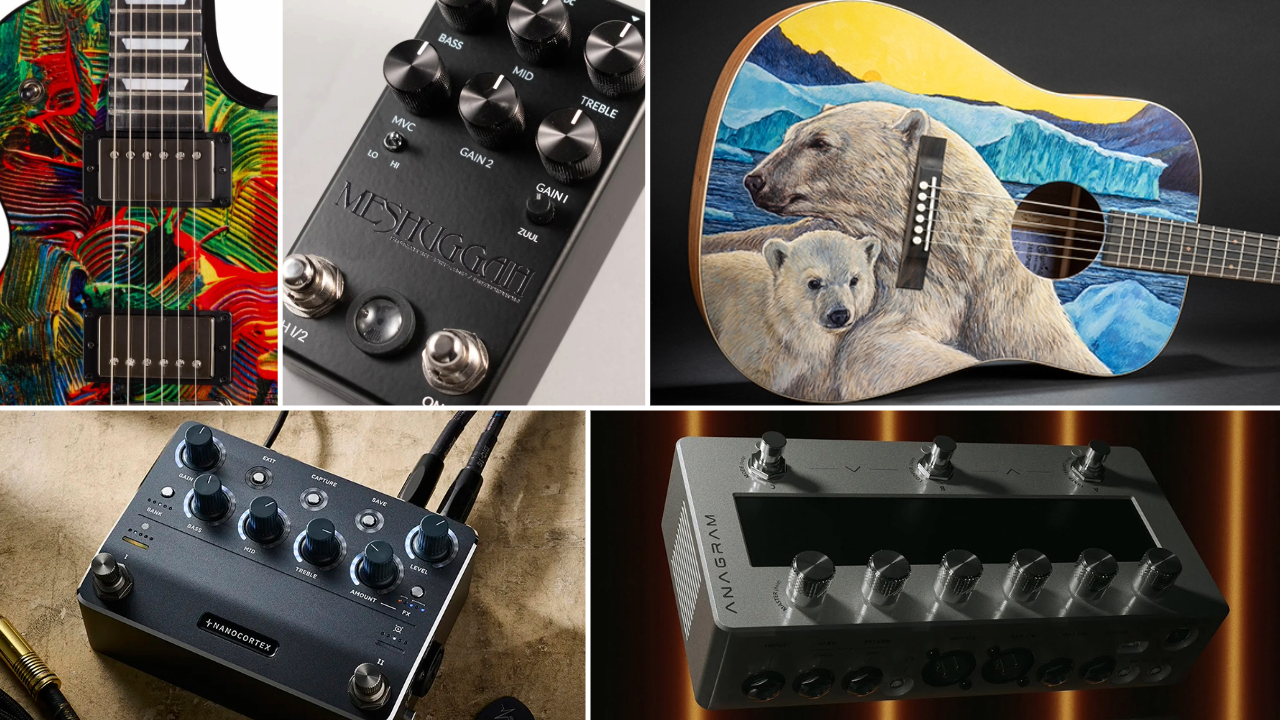Melvins’ Buzz Osborne: “We’ve written and recorded more than 500 songs – what can we do to keep it fresh?”
The Melvins prove themselves to be the band not even God can put a stop to

Note: this article is also featured in Australian Guitar #142, which is out now wherever great magazines are sold! Click here to read more about what’s in this jam-packed issue!
Every Melvins fan seems to have a different perspective on how many albums the longstanding alt-metallers have slapped their name on. Are we strictly talking studio albums with ten or more tracks? What about the distinction between the stock-standard Melvins, Melvins Lite and Melvins 1983? Do collaborative albums, b-side comps, bootlegs or EPs count? What about Buzz Osborne's solo work, since there’s often overlap between the Melvins crew and his own band?
Whatever number you settle on, don’t get too used to it – the Washington state alt-metallers are as busy as they’ve ever been, having just dropped their latest full-length with the Melvins ’83 lineup, Working With God, with another massive project set to land before the year’s end. Osborne is determined to make the 2020s another landmark year for the project he’s slaved away on since age 19, and though many of his peers have long since succumbed to creative drought, industry burnout or arthritis (the lattermost any guitarist’s worst possible nightmare), Osborne has never had so many god-tier ideas.
For now, though, let’s embrace the Melvins’ latest bright, boomy and surprisingly brutal studio effort, as Osborne walks us through the story behind Working With God.
What’s the creative dynamic like between you three compared other Melvins lineups?
Well Dale and I live in Los Angeles, and Mike lives in Washington state. For those that don’t know, that’s about 1,200 miles north of us; it’d be like we lived in Adelaide and him in Brisbane, y’know? So it’s not like we can rehearse all that often. Plus Mike’s a union machinist, he has kids, a wife and a house, etcetera – so he can’t be in Melvins mode all the time. Whereas Dale and I, we’re professional musicians\〝 we play all day, every day – and so when we want to do something with Mike, Dale and I have to work on stuff without him, then send him the songs, then fly him down on a Thursday night after work so he can take Friday off, go into the studio, record Friday, Saturday and early Sunday, and then fly home Sunday night. We did that a couple of times, and then we had the record done.
It’s kind of crazy to think that Working With God is your 24th (proper) studio album – by this point, realistically, the creative well should’ve run dry years ago. What keeps it full for you?
I just kind of think about what I want to do, and dream it up from there. I can write songs all the time – although I haven’t been as prolific as normal during the pandemic, because I don’t really want to record a bunch of new songs and then not be able to do anything with them. But Mike and I have been friends since high school, and it was obvious when we started playing together in ’82 or ’83 that if I was going to do anything with music, I would have to get out of Washington. But he was not going to move – he literally lives less than a mile from the house he came home to after he was born. So he wasn’t destined to leave the area, and it wasn’t realistic for me to think that was ever going to happen. But we’ve remained friends ever since, and it’s nice for us to be able to get back together and play music every so often. I can’t think of any other band that would do that.
You’re on the same wavelength, creatively.
That, and the fact we both have really dark senses of humour – which I think is fairly evident on this record. It’s evident on all our records, really. Our band is called Melvins – how tremendously serious can we be? We take the music very seriously, but we still have massive admiration for bands like The Fugs. We’re like The Fugs and Captain Beefheart with heavy metal.
Get The Pick Newsletter
All the latest guitar news, interviews, lessons, reviews, deals and more, direct to your inbox!
Some of your guitar parts on this record are absolutely ripping. Were you keen to really tap into your inner shredlord?
Well I’ve always been able to do that kind of stuff, I just never practised it that much. I just never saw the point, y’know? I never really wanted to do that stuff, even though I can do it. There’s a saying in golf where they say, “Don’t practise stuff you’re not going to do.” As much as I appreciate players like Eddie Van Halen, that style never really spoke to me in a way that made me want to do that. I never really cared about that. I was more kind of bluesy based I guess – I was trying to be like Billy Gibbons crossed with Andy Gill from Gang Of Four, mixed in with a bit of Throbbing Gristle.
So what brought the heaviness out of you on this record?
I don’t know… I write whatever songs come to mind. If you told me to write a heavy metal song, I’d go, “Okay!” I can sit down and start riffing away ’til I figure something out in one way or another; I don’t have a lot of rules when it comes to playing the guitar. I can do lots of stuff in odd tunings and try different things out to inspire myself, but I’ve never been formally trained. Even though I write almost all the stuff I play, I don’t know how to read a bar of it.
It’s always better to go with what’s in your heart, not in a book.
I think so! I have a much more neanderthal approach to the guitar – the solo on “Hund” is lots of fast triplets, but that stuff isn’t too hard. The hard part is the odd timing of the rhythms – that stuff is harder to figure out than the soloing. But soloing is something I think is really important, and I have a strange approach to it – it’s not really jamming, it’s a lot more meticulous. I’m glad we brought up “Hund”, because I think that solo is particularly good.
How’d you come up with it?
I just sat there with my guitar and played until I figured something out that I really liked, and that worked with the song. That rhythm part under was particularly interesting to solo over because it’s kind of herky-jerky, and there’s no rhythm guitar in it. It’s drums, bass and one guitar. I like to write solos over parts that don’t have any rhythm guitar, so it stands out a little better.
Well if you have a great solo, why not give it the spotlight?
Yeah! I mean sometimes it doesn’t make much of a difference to the song as a whole, but it’s like, we’ve written and recorded more than 500 songs – what can we do to keep it fresh? We record in a million different ways and try all kinds of things – I rarely use the same setup live that I do in the studio, for example. I have a lot of guitars that I use in the studio, which I couldn’t use live because they’re not set up right. In the studio, you don’t have to worry about things like pickup switching and how the equipment will translate to certain pieces of gear.

Ellie Robinson is an Australian writer, editor and dog enthusiast with a keen ear for pop-rock and a keen tongue for actual Pop Rocks. Her bylines include music rag staples like NME, BLUNT, Mixdown and, of course, Australian Guitar (where she also serves as Editor-at-Large), but also less expected fare like TV Soap and Snowboarding Australia. Her go-to guitar is a Fender Player Tele, which, controversially, she only picked up after she'd joined the team at Australian Guitar. Before then, Ellie was a keyboardist – thankfully, the AG crew helped her see the light…
“I loved working with David Gilmour… but that was an uneasy collaboration”: Pete Townshend admits he’s not a natural collaborator – even with bandmates and fellow guitar heroes
“You’ve gotta lose the fuss. You grab the new guitar, you scratch it. Grab the key right away": Kiko Loureiro on why players shouldn’t be too precious about their guitars







![[from left] George Harrison with his Gretsch Country Gentleman, Norman Harris of Norman's Rare Guitars holds a gold-top Les Paul, John Fogerty with his legendary 1969 Rickenbacker](https://cdn.mos.cms.futurecdn.net/TuH3nuhn9etqjdn5sy4ntW.jpg)


